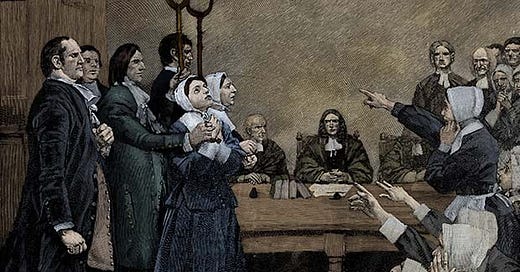Sleep Paralysis, the Occult and Folklore pt.1
Let's explore the roots of the relationship
Part I
Whilst the features of the sleep paralysis experience has not changed since it was recorded by Paulus Aeginita, a 7th-century Byzantine Greek physician, the negative stigma and its connection to the occult, the Devil and evil forces are still highly pertinent today, which is to be expected given the frightening nature of the experience and the things that are seen and felt.
This negative relationship is not new. For over 2000 years speculations as to the cause of sleep paralysis have been discussed by Chinese and European writers who referred to it as the ‘nightmare’. For example, the influential Greek physician Galen examined the cause of the ‘nightmare’ during the second century AD, and a description of the sleep paralysis experience appears in a Chinese Book on dreams written in 400 BC (Owen, 2003).
The ‘Night-mare’
Sleep paralysis or the ‘night-mare’ as it was called during the 1500s was attributed to either witchcraft or gastric digestion problems. The witchcraft version included: ‘accounts where people claimed to have been nocturnally oppressed by such supernatural beings such as the Devil, animalistic fairies, and spirits of the dead’ (Owen, 2003).
John Bond, a medical doctor and frequent experiencer of sleep paralysis, wrote the first medical study of the ‘night-mare’ in 1753, stating that: I have been so much afraid of its intolerable insults, that I have slept in a chair all night, rather than give it an opportunity of attacking me in a horizontal position (Bond, 1753).
Historically, people have sought a physical or human cause for the occurrences. The witchcraft trials (that took place in 1692) where accounts of sleep paralysis and witchcraft are prevalent, included reports of sleep paralysis being induced in Salem by witches and spells.
The Salem trials have been extensively researched by Owens (2003) who provides us with information from one of the trials where the accused witch Susan Martin said;
"Some She-Devil would shortly fetch him away." That night, "as he lay in his bed, there came in at the window, the likeness of a cat, which flew upon him, took fast hold of his throat, lay on him a considerable while, and almost killed him." Bernard Peach also testified that, one night, "he heard a scrabbling at the window, whereat he then saw Susanna Martin come in, and jump down upon the floor. She took hold of this deponent's feet, and drawing his body up into an heap, she lay upon him near two hours; in all which time he could neither speak nor stir." When the paralysis finally began to wear off she bit Martin's fingers and she "went from the
chamber, down the stairs, out at the door"
I hope you enjoyed this post. The second part will be available soon.
FUN FACT
In older English, they called sleep paralysis the mare, from the Anglo-Saxon root word ‘merran’ which means ‘to crush.’ And eventually, it was called the night-mare, meaning the crusher who comes in the night. But in the modern world, we call it sleep paralysis.
When we casually say: ‘I had a nightmare,’ it comes from the term ‘sleep paralysis’
Taken from David Hufford’s paper Sleep Paralysis as a Spiritual Experience
I hope you enjoyed this post.
Please like it to show your support.
With Love and Light as we Journey Together.
Have a great weekend
Sheila.









Hi Shelia,
I have enjoyed the article. I was nicely written and informative. I will be waiting for part 2. I have had both a nightmare and sleep paralysis neither are enjoyable. Research has indicated blood flow and other reasons but I think otherwise. I believe we all are searching for answers but some are unwilling to accept some truths. Thank you for sharing.